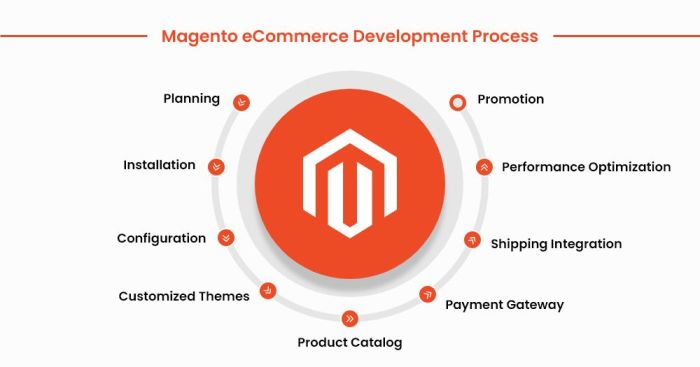How Magento Developers Drive Ecommerce Innovation: A Comprehensive Guide
Delving into the realm of ecommerce innovation, this guide sheds light on the pivotal role played by Magento developers. With a focus on enhancing online shopping experiences, Magento developers are instrumental in shaping the digital landscape of retail.
Exploring their customization capabilities, integration with third-party tools, and performance optimization strategies, this guide offers a detailed insight into how Magento developers drive ecommerce innovation forward.
Overview of Magento Development
Magento developers play a crucial role in driving ecommerce innovation by leveraging the powerful features of the Magento platform to create unique and user-friendly online shopping experiences. Their expertise in coding, customization, and integration enables them to develop tailored solutions that meet the specific needs of businesses and consumers alike.
Enhancing Online Shopping Experiences
- Magento developers contribute to enhancing online shopping experiences by creating responsive and visually appealing websites that are optimized for mobile devices, making it easier for customers to browse and make purchases on-the-go.
- They also implement advanced search and filtering capabilities, personalized product recommendations, and seamless checkout processes to streamline the buying journey and increase customer satisfaction.
- Furthermore, Magento developers integrate third-party extensions and tools to enhance functionality, such as integrating with social media platforms for easy sharing and promoting products, improving customer support with live chat features, and implementing advanced analytics for data-driven decision-making.
Significance of Magento as an Ecommerce Platform
Magento is widely recognized as a leading ecommerce platform due to its flexibility, scalability, and robust features that cater to businesses of all sizes. As an open-source platform, Magento allows developers to customize and extend its capabilities to meet specific business requirements, making it a popular choice for creating innovative ecommerce solutions.
- With a large community of developers and a vast marketplace of extensions and themes, Magento offers endless possibilities for creating unique and feature-rich online stores that stand out in the competitive ecommerce landscape.
- The platform's modular architecture and API integrations enable seamless connectivity with other systems and technologies, allowing businesses to optimize their operations, improve efficiency, and deliver exceptional customer experiences.
- Overall, Magento serves as a powerful foundation for ecommerce development, empowering Magento developers to drive innovation and deliver cutting-edge solutions that elevate the online shopping experience for businesses and consumers alike.
Customization Capabilities
Magento developers are adept at leveraging customization to address unique business requirements effectively. This ability to tailor online stores to specific needs is a key factor in driving ecommerce innovation.
Flexibility of Magento for Customizing Online Stores
Magento's flexibility shines through when it comes to customizing online stores. Developers can tap into a wide range of tools and functionalities to create a tailored shopping experience for customers.
- Magento's modular architecture allows developers to add or remove features easily, depending on the business requirements.
- Themes and templates in Magento can be customized to reflect a brand's identity and enhance user experience.
- Extensions and plugins offer additional functionality that can be integrated seamlessly into Magento-powered online stores.
Process of Customizing Features and Functionalities in Magento
Customizing features and functionalities in Magento involves a systematic approach to ensure a seamless user experience and meet business objectives.
- Identifying the specific requirements of the business and target audience.
- Planning the customization process, including defining scope, timeline, and resources needed.
- Developing and implementing custom solutions using Magento's robust framework and tools.
- Testing the customized features thoroughly to ensure they function as intended and do not disrupt the overall shopping experience.
- Deploying the customized features on the live site and monitoring their performance to make any necessary adjustments.
Integration with Third-Party Tools
When it comes to enhancing ecommerce functionalities, Magento developers often rely on integrating third-party tools. These tools can provide additional features, improve user experience, and streamline business operations.
Popular Third-Party Integrations
- Payment Gateways: Integrating payment gateways like PayPal, Stripe, or Square allows customers to securely make online transactions.
- Shipping Providers: Integration with shipping providers such as UPS, FedEx, or USPS enables real-time shipping calculations and tracking information for customers.
- Marketing Automation Tools: Tools like Mailchimp, HubSpot, or Klaviyo can be integrated to automate email campaigns, target specific customer segments, and analyze marketing performance.
- Analytics Platforms: Integrating Google Analytics or Adobe Analytics helps Magento store owners track website traffic, user behavior, and conversion rates to make informed business decisions.
Impact of Integrating External Tools on Ecommerce Innovation
Integrating third-party tools into Magento can have a significant impact on ecommerce innovation. By leveraging these tools, developers can enhance the overall functionality of an online store, provide a better shopping experience for customers, and drive business growth. These integrations enable Magento stores to stay competitive in the ever-evolving ecommerce landscape and adapt to changing consumer preferences efficiently.
Performance Optimization
Magento developers play a crucial role in optimizing the performance of ecommerce websites to enhance user experience and drive innovation in the industry.
Techniques for Performance Optimization
- Implementing Caching Mechanisms: Developers use caching techniques to store frequently accessed data, reducing load times and improving site performance.
- Optimizing Images and Media: Compressing images and multimedia files without compromising quality helps in faster loading times and smoother user experience.
- Minifying Code: By removing unnecessary spaces, characters, and lines from the code, developers reduce file sizes and improve site speed.
- Utilizing Content Delivery Networks (CDNs): CDNs distribute website content across multiple servers globally, reducing latency and improving loading times for users worldwide.
Importance of Performance Optimization
Performance optimization is essential for driving ecommerce innovation as it directly impacts customer satisfaction, conversion rates, and overall business success. A fast-loading website enhances user experience, increases engagement, and boosts sales, ultimately leading to a competitive edge in the market.
Closing Summary

In conclusion, Magento developers stand at the forefront of ecommerce innovation, continuously pushing boundaries and creating dynamic online shopping experiences. Their expertise and dedication play a crucial role in shaping the future of digital commerce.
User Queries
How can Magento developers enhance online shopping experiences?
Magento developers achieve this by customizing features and functionalities to meet unique business requirements, thus creating engaging and user-friendly online stores.
What are some popular third-party integrations used by Magento developers?
Popular third-party tools integrated by Magento developers include payment gateways like PayPal, shipping solutions like ShipStation, and marketing automation platforms like Mailchimp.
Why is performance optimization important for driving ecommerce innovation?
Optimizing performance ensures fast site speeds and enhanced user experiences, which are crucial for attracting and retaining customers in the competitive ecommerce landscape.




